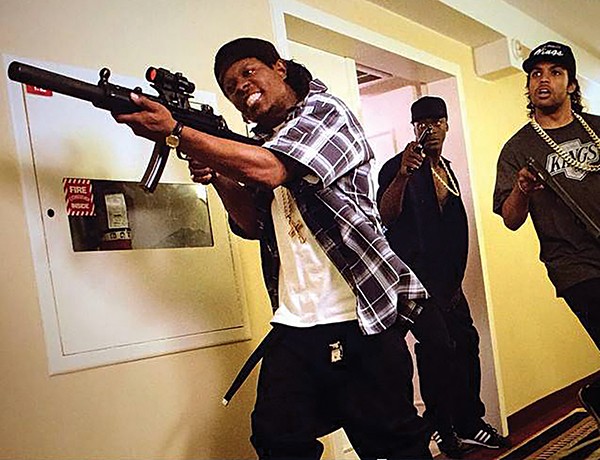It is strangely gratifying that pioneering hip-hop group N.W.A still has the power to shock and provoke 27 years after their first album was released. But here we are, in 2015, and the film based on their career, Straight Outta Compton, has been greeted with denunciation from police unions and a level of security around the screenings that borders on the absurd. And yet, the R-rated film, which lacks any superheroes, defied all expectations by more than doubling its $29 million budget in three days of release.
The takeaway here is that Ice Cube knows what the hell he’s doing. Twenty years into his producing career, his company Cube Vision has never lost money on a movie. Not even legends like Robert Evans can say that. Cube knows what his audience wants, and he gives it to them. He’s content to take a safe base hit rather than swing for the fences and risk a strikeout, and you can see that thinking play out in Straight Outta Compton, a by-the-numbers musical biopic in the tradition of Ray and Coal Miner’s Daughter.

N.W.A in a post-Ferguson America
But there’s a reason formulas become formulaic: They work. Director F. Gary Gray, whose credits begin with Ice Cube’s music video “It Was a Good Day” and his first feature film, Friday, executes expertly on all levels without succumbing to the temptation to get flashy. Of the two shots that stuck with me — one, a tracking shot through a crowded parking lot in front of a Los Angeles skating rink, echoes a scene in Hustle & Flow; while the other, a rack focus down a line of Nation of Islam recruits, would be at home in an ’80s Ridley Scott perfume commercial. If it sounds like I’m slagging on Gray, I’m not. This isn’t Love & Mercy, the Brian Wilson biopic that used structural tricks and psychedelic sound design to depict the inner life of an artist struggling with mental illness. Straight Outta Compton is disciplined, professional filmmaking where the director has enough sense to know his subject matter is so epic that telling the story straight is enough to make it work.
Gray introduces Easy-E (Jason Mitchell) and the setting of 1987 L.A. with an opening scene in a crack house where Easy barely escapes a tank-assisted police raid. In that one scene, Gray makes a case for his film’s relevance. L.A. police chief Daryl Gates was a pioneer of militarized policing, and the practices he advocated have become the focus of national protests in post-Ferguson America. It’s telling how the film equates the violent methods of the police with those of Suge Knight (R. Marcos Taylor). Straight Outta Compton puts the audience in young black men’s sneakers as they are caught between cops who arrest you for walking down the street and the violent gangs in their own neighborhood.
The cast is perfectly chosen. No doubt the film’s hardest job fell to O’Shea Jackson Jr. Actors, imagine getting this assignment: “You have to play the executive producer when he was a young man. Also, he’s your dad. Also, he’s Ice Cube.” Corey Hawkins looks so much like a young Dr. Dre, it’s spooky. Mitchell doesn’t really resemble Easy-E, but when he’s going toe-to-toe with Paul Giamatti, who plays N.W.A’s manager Jerry Heller, you can see why he got the job.
As you would expect, Straight Outta Compton is full of sex, violence, drugs, and hard-hitting music. And yet, it still seems like a sanitized version of the truth. Even in 2015, it’s still radical that a group of black men have seized the means of production and told their own story. But that’s a double-edged sword. Like all of us, they’re painting themselves as the heroes of their own story, and like all of us, the truth is likely more complex. MC Ren (Aldis Hodge), for example, barely registers in the movie. It made me wish for a warts-and-all documentary on the group, not because I didn’t believe the story, but because I feel compelled to dig deeper into a fascinating period of American cultural history. But Straight Outta Compton is mythmaking, not journalism, and it’s the myth we need now. To paraphrase The Man Who Shot Liberty Valance: This is the West Coast. When the legend becomes fact, print the legend.